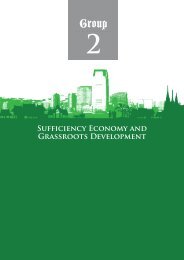Conflict, Legitimacy and Government Reform: Equitable Allocation of ...
Conflict, Legitimacy and Government Reform: Equitable Allocation of ...
Conflict, Legitimacy and Government Reform: Equitable Allocation of ...
Create successful ePaper yourself
Turn your PDF publications into a flip-book with our unique Google optimized e-Paper software.
164 KPI Congress XI<br />
governments as it has always been used?” <strong>and</strong> “What recommendations<br />
should there be to promote the body <strong>of</strong> knowledge on “political<br />
legitimacy” to Thai people in a creative way that agrees with a national<br />
democratic government under constitutional monarchy <strong>and</strong> to help push<br />
Thai politics into a better direction. With these issues in mind, the<br />
writer conducted a literature review on various literature <strong>and</strong> researches<br />
to find answers for the aforementioned issues.<br />
The writer proposes a new perspective on political legitimacy in that<br />
it should broadly cover every sector <strong>and</strong> every part <strong>of</strong> the term “politics”.<br />
“Political legitimacy” should not be the term used only to stimulate<br />
creative political conscience with governments, but should also be used<br />
with the opposition, senators, judicial organizations, statutory free<br />
organizations, media, private development organizations, academic<br />
pr<strong>of</strong>essionals <strong>and</strong> society as individuals <strong>and</strong> other sectors raise the level <strong>of</strong><br />
“Thai political development” so political legitimacy genuinely occurs in<br />
terms <strong>of</strong> content <strong>and</strong> process which will eventually lead to desired<br />
political stability.<br />
Finally, the writer recommends that there be a process for<br />
promoting the body <strong>of</strong> knowledge on “political legitimacy” <strong>and</strong> other<br />
important bodies <strong>of</strong> knowledge such as overall bodies <strong>of</strong> knowledge on<br />
“politics” <strong>and</strong> on “democracy” to the public, who can be divided into 2<br />
major groups: 1. The youth studying from kindergarten to high school<br />
<strong>and</strong> those who are studying at the college level as well, <strong>and</strong> 2. The general<br />
public who has already left educational facilities since adolescence,<br />
middle age <strong>and</strong> senior adulthood.<br />
The author believes that a clear <strong>and</strong> tangible method that can<br />
effectively create the aforementioned processes in the two sectors <strong>of</strong><br />
people is the creation <strong>of</strong> a curriculum <strong>of</strong> at least three years’ duration <strong>and</strong><br />
the process must not be thought by memorization, but it utilize “child<br />
centers”, “citizen dialogue” <strong>and</strong> “facilitators” as core processes because<br />
these bodies <strong>of</strong> knowledge are not about memorization, but they are<br />
about asking questions <strong>and</strong> collectively finding the answers wherein the<br />
facilitator is the one who gradually takes the two sectors <strong>of</strong> public toward<br />
the goal in order for the knowledge, realization, responsibility <strong>and</strong><br />
conscience <strong>of</strong> citizenship to occur genuinely.














